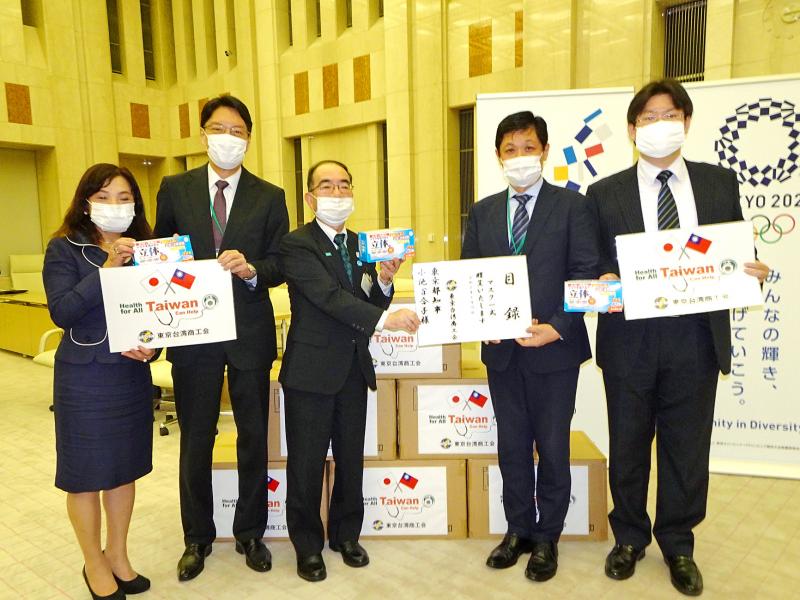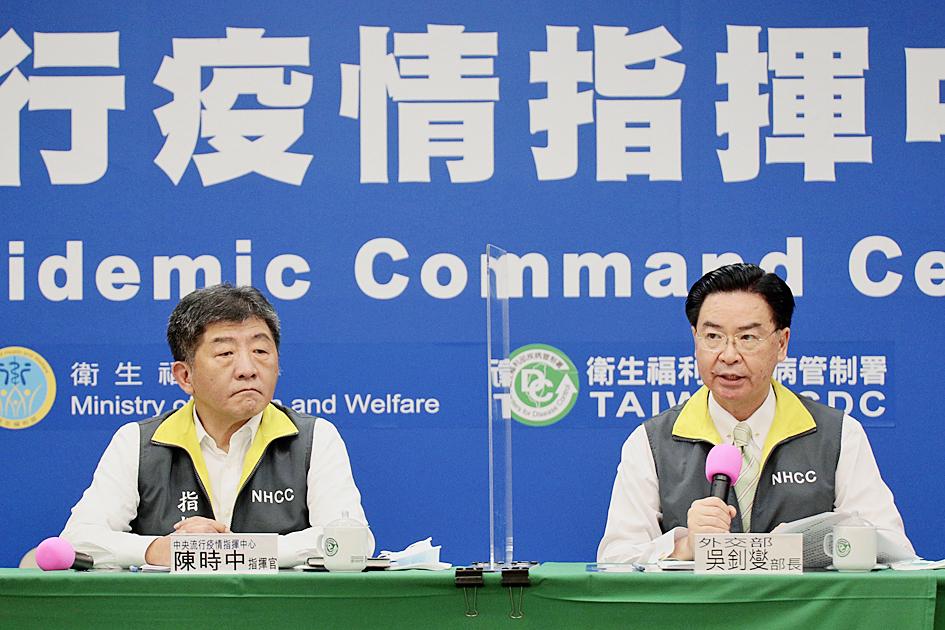Taiwan deeply regrets and is very dissatisfied that it was not invited to attend the annual World Health Assembly (WHA), which began a virtual meeting yesterday, Minister of Health and Welfare Chen Shih-chung (陳時中) and Minister of Foreign Affairs Joseph Wu (吳釗燮) said.
During the Central Epidemic Command Center’s daily news conference, Chen, who heads the center, said that as of 2pm, Taiwan had not received an invitation to the meeting, which was to begin at 6pm Taiwan time.
“We put in our efforts [to get invited] up until the last moment, but it seems that we are unlikely to be invited, so we want to express our regret and dissatisfaction for the situation, as well as protest against it,” he said.

Photo: CNA
He said a letter of protest was sent yesterday the WHO Secretariat, which is headquartered in Geneva, Switzerland.
While the focus of this year’s WHA should be on the COVID-19 pandemic, Taiwan’s performance in fighting the coronavirus is worth sharing with other nations, so Taiwan’s exclusion from the meeting is a loss for the WHO, as well as harmful to Taiwan, as it cannot learn from WHO members’ experiences, Chen said.
“We hope the WHO can remain professional and politically neutral, refuse political interference and not neglect the right to health for any area or anyone in the world, as it should be equal to all,” he said.

Photo: AFP / Central Epidemic Control Center handout
Wu said 29 nations had expressed support for Taiwan’s WHO participation, all of its diplomatic allies submitted a proposal to the WHO for Taiwan to be invited, and a growing number of world leaders have spoken out publicly for Taiwan.
Prominent political figures from 43 nations, including more than 600 legislators, have expressed support for Taiwan’s WHO campaign, and an unprecedented outpouring of support for Taiwan’s WHO participation has been seen in international media reports, commentaries, letters to the editor and editorials, he added.
“Our actions speak for themselves — Taiwan can help, and Taiwan is helping,” Wu said.
Taiwan’s hospitals have shared their experience in fighting COVID-19 with other nations through videoconferences, and the government is working closely with the US and European countries to develop rapid testing kits, vaccines and medicine, he added.
Taiwan has donated 27.5 million masks, 131 infrared thermal imaging cameras, 35,000 forehead thermometers and 250 automatic body temperature detection systems to countries in need, helping more than 80 countries, Wu said.
It is preparing to donate 23.5 million more masks, 1.16 million N95 masks, 170,000 protective gowns, 600,000 isolation-unit gowns, 70 respirators and 500,000 quinine tablets, he said.
“The Chinese government claims it takes care of the health of Taiwanese, but has deprived the people of Taiwan time and time again, which will only increase Taiwanese antipathy to it,” he said. “They will not give up the collective wish to increase international participation and contribute to the world.”
“The UN General Assembly Resolution 2758 or the WHA Resolution 25.1 did not mention Taiwan, nor authorize the People’s Republic of China to represent Taiwan,” he said. “Taiwan is a democratic country and only the Taiwanese government elected by the people can represent them to take part in international organizations.”
Wu urged the WHO Secretariat to listen carefully to reasonable appeals from the international community, resist interference by the Chinese government and allow Taiwan to take part in all WHO meetings, mechanisms and activities.
The Chinese Nationalist Party (KMT) also expressed regret yesterday that Taiwan was not invited to this year’s WHA.
Taiwan’s COVID-19 response has been above average, and if the nation could become a WHO member, it would be able to share its experience with other nations more quickly, the party said.
Beijing should not ignore the right to health of Taiwanese because of differences in political opinions with the Democratic Progressive Party (DPP), it said.
While it expressed its gratitude to the nation’s allies who submitted a proposal for Taiwan’s meaningful participation in the WHA, as well as the ones who voiced verbal support, the KMT called on the DPP government to assess the effectiveness of its “mask diplomacy” and New Southbound Policy, and to “explain why most recipient countries or target countries have not provided practical support for [Taiwan’s] participation.”
Additional reporting by Sherry Hsiao and CNA

CHAOS: Iranians took to the streets playing celebratory music after reports of Khamenei’s death on Saturday, while mourners also gathered in Tehran yesterday Iranian Supreme Leader Ayatollah Ali Khamenei was killed in a major attack on Iran launched by Israel and the US, throwing the future of the Islamic republic into doubt and raising the risk of regional instability. Iranian state television and the state-run IRNA news agency announced the 86-year-old’s death early yesterday. US President Donald Trump said it gave Iranians their “greatest chance” to “take back” their country. The announcements came after a joint US and Israeli aerial bombardment that targeted Iranian military and governmental sites. Trump said the “heavy and pinpoint bombing” would continue through the week or as long

TRUST: The KMT said it respected the US’ timing and considerations, and hoped it would continue to honor its commitments to helping Taiwan bolster its defenses and deterrence US President Donald Trump is delaying a multibillion-dollar arms sale to Taiwan to ensure his visit to Beijing is successful, a New York Times report said. The weapons sales package has stalled in the US Department of State, the report said, citing US officials it did not identify. The White House has told agencies not to push forward ahead of Trump’s meeting with Chinese President Xi Jinping (習近平), it said. The two last month held a phone call to discuss trade and geopolitical flashpoints ahead of the summit. Xi raised the Taiwan issue and urged the US to handle arms sales to

State-run CPC Corp, Taiwan (CPC, 台灣中油) yesterday said that it had confirmed on Saturday night with its liquefied natural gas (LNG) and crude oil suppliers that shipments are proceeding as scheduled and that domestic supplies remain unaffected. The CPC yesterday announced the gasoline and diesel prices will rise by NT$0.2 and NT$0.4 per liter, respectively, starting Monday, citing Middle East tensions and blizzards in the eastern United States. CPC also iterated it has been reducing the proportion of crude oil imports from the Middle East and diversifying its supply sources in the past few years in response to geopolitical risks, expanding

Pro-democracy media tycoon Jimmy Lai’s (黎智英) fraud conviction and prison sentence were yesterday overturned by a Hong Kong court, in a surprise legal decision that comes soon after Lai was jailed for 20 years on a separate national security charge. Judges Jeremy Poon (潘兆初), Anthea Pang (彭寶琴) and Derek Pang (彭偉昌) said in the judgement that they allowed the appeal from Lai, and another defendant in the case, to proceed, as a lower court judge had “erred.” “The Court of Appeal gave them leave to appeal against their conviction, allowed their appeals, quashed the convictions and set aside the sentences,” the judges